Chris Manion's Blog, page 3
March 28, 2021
Pruning: A Lesson in the Garden of Life
Pruning is something I have to make myself do. I like things to look natural. At some point, whether it’s a beard or a bush, most things can use trimming up.
So I snipped.
I snipped too fast.
I do quite a few things too fast.
[image error]The roses in my garden looked leggy, so I retrieved my pruning clippers, garbage can, and my most protective gardening gloves. Snip. Snip.
I took me a while to learn not to wince while pruning. I loved all the leaves or flowers on branches, vines, and stalks that bring me such peace and joy in my garden. Without regular pruning, however, many of the things I love grow awkward, out-of-shape, and crowd out other beauties nearby.
Pruning is a necessary element in a garden and a soul. So is paying attention.
If we do life too fast, we lose an opportunity to enjoy beauty.
In winter, a hard pruning of the rose bushes produces abundant new growth in spring. In Florida, the roses are dormant in winter, but often they bloom throughout the season, especially the shrub rose. So there’s no good time or day to prune the roses. Just do so before the onset of spring, warm weather, fresh growth.
When pruning, keep your eyes on your work.Soon the clipped branches filled the garbage can. Some branches, unattended too long, had to be cut down into smaller sections to fit. The work tired me and as usual, I pushed myself to go on a bit more. Sometimes, it’s better to rest, take a break, or simply continue the work the next day.
I took my eyes off the branch I was trimming, assessing the next one to prune. Clip. Clip.
As I placed the pruned branches in the trash can, a lovely red lip smiled at me from inside its bud. I shook my head. I’d clipped a bloom which I tried not to do in this particular pruning. Putting it aside, I slowed myself down a smitch and finished my work.
After closing the lid on the clippings and putting the trashcan roadside to be collected, I stored my garden gloves and clipper, then took the budding branch inside and placed it in a glass jar.
[image error]
[bctt tweet=”When pruning, keep your eyes on your work. When being pruned, keep your eyes on God” username=”chrismanionbook”]
Chris Sauter Manion
That one clipping rewarded me for over a week with a glorious opening of its petals, smiling at me on my windowsill as I washed vegetables, dishes, and filled my filtered water container. An accidental clipping became a lesson of how God uses everything, how beauty exists in each moment when we slow ourselves enough to take the time to notice.
[image error]See as God seesHow easily God forgives our sins as I forgave myself for a careless clipping. And how refreshing one single recovered flower or sinner can be to the one who sees its beauty.
Of course, there are no mistakes when God does His pruning.
The next time you sense a pruning moment for your heavenly Father, perhaps you might shift what you focus on. Instead of the pruned place that smarts from the shaping or discipline, perhaps you can see yourself in God’s vase as He gazes upon you day after day, waiting for you to open your beauty to Him, seeing His loving eyes upon you, and the smile you bring to His face.
Instead of focusing on what you may have lost, focus on where new sprouts are budding. Where do you sense that happening within you? Around you?
Quotes to Memorize about Pruning[image error]a freshly pruned branch cut stands outSpiritual pruning enhances spiritual growth by removing whatever inhibits growth. Memorize one or two of these Scripture quotes to remind you of this truth. Behold yourself as God’s beloved, as God’s holy temple, as a beautiful flower or fruit tree in God’s garden.
“And he who was seated on the throne said, “Behold, I am making all things new.” Also he said, “Write this down, for these words are trustworthy and true.”
Revelation 21:5
“Remember not the former things,
nor consider the things of old.”
Isaiah 43:18
“For behold, I create new heavens
Isaiah 65:17
and a new earth,
and I shall not remember the former things
or come into mind.”
For more like this, click for Lessons Learned in Defending Your Christian Faith.
Or here
~ Pin for Later ~
[image error]
The post Pruning: A Lesson in the Garden of Life first appeared on Chris Manion.
February 28, 2021
Surrender to love and a tea party: an invitation

You never know when you’ll need to surrender to love. Chances are, it’ll be a test.
Genesis 22 involves a test of surrender for Abraham and Isaac. An image of my grandson setting a tea party got me thinking about God the Father as well as Abraham in that scene.
Just as Abraham pleased God with his obedience when requested to sacrifice his son—”your only son, the one you love” (Genesis 221-2 JB)—shouldn’t we be pleased with God for His same sacrifice?
God stayed Abraham’s hand at the end of the test. “I won’t ask that of you,” He seems to say. “I have something better. I’ll offer my own Son…”

Isaac was a part of Abraham – long-desired, loved, as God noted. But he existed apart from Abraham, a separate being. And old enough to surrender of his own volition – Scripture research shows him as being in his mid-thirties when he carried the wood up the mountain for the sacrifice.
They’re all around us, you know, sacrifices like Isaac’s, at least his willingness to sacrifice himself, to lay willingly down in obedience on the woodpile.
Jesus, God’s Son whom He willingly sacrificed out of love for all people for all time on a piece of wood, was loved, too. But not apart. Jesus and the Father are one. That’s what made me focus on God the Father.
The Father’s surrender to loveMost of the time, we focus on Jesus’ suffering during His passion, and rightly so. But what about His Father’s suffering? If they’re one . . . .
Have you ever watched someone you love in pain? I’m sure you have. We know how hard it is. We want to relive their agony and often can only be present, pray, and maybe try to soothe them.
What did God the Father experience as He watched men whom He created whip His Son, drop Him into a pit of vermin and spiders? As he carried His own heavy beam? As He watched soldiers strip His Son, pound iron nails into Him, and ridicule Him?
What pain did He experience since He was one with His Son? Was the pain the same as His Son?
Is that why Jesus asked us to do unto others as we’d like to be done to? Because we’re all one – we just haven’t realized it to the fullness that the Father and Son knew? Because He knew what His Father experienced?
He knew what He felt as He and His Father watched us hurt one another over the centuries. Did He command us to love one another because He wants to spare us that pain when we come into a conscious awareness of our oneness? Some theologians call that Christ conciousness. Other scall it surrender to love.
Did God the Father feel Christ’s pain?How much agony did God the Father suffer when He had the power to halt the proceedings, to end the life of each man who brutalized His Son? Where does the Almighty God of the Universe go to mourn in silence when He is already everywhere?
Did God’s agony rip itself down the curtain of the Holy of Holies? Did darkness descend upon the whole universe when He mourned His Son’s death, or just over Jerusalem?
I know there are no answers, not now, not yet. But these questions wiggle into my mind, perhaps from God’s Spirit, desiring me to know Him more deeply.
Does He not always draw us closer to seeing as He sees, feel as He feels, love as He loves?
Love sets a feast. . .Death isn’t the ending to the salvation story. Death has no sting with God. He is with us in everything. He knows our pain.
Jesus rose again. We believe in the resurrection of the body (Apostle’s Creed) because of Him. There is light after the darkness, life after death. God separated the light from the darkness (Genesis 1:3-5). Yay! He gave us a new and eternal covenant sealed with His blood. Take and drink.
We are not human beings having a spiritual experience, but spiritual beings having a human experience.
Pierre Teilhard de Chardin, S.J.
God sets a feast before us. Bread of life. A cup of salvation.
. . . and a tea party.You may not choose to sit with God when he sets a tea party before you as my grandson sets one each day for his little calico critters. But He won’t stop trying to feed you and have time with you. Click here for more on his little fingers and God’s hands.
 When God sets a tea party before you, will you have time for Him?
When God sets a tea party before you, will you have time for Him?You cannot run from Him. He will gently pursue you as a parent goes to a child who’s angry, hurting, or afraid. Or as a child feeds his calico critters.
Tea…? Meow …
my little grandson to his Calico Critters
God knows everything. We don’t have to explain much in our prayers.
I can hide nothing from Him, but He will also not force me to surrender to Him whatever I choose to withhold. He can not force me to obey Him despite all He suffered for me . . . Love does not work like that. Can not work like that.
Can you imagine this kind of love? Will you try to release what you hold onto as He released His Son?
Can you imagine His blissful smile when you obey? And the abundant blessings that will follow?
All too often, we focus only on ourselves and how it hurts to let go. We want the control. We like the victim status. We’re used to grinding our teeth, hunching our shoulders, pulling our hair.
We each endure the agony of the moment we surrender to love as Jesus endured His surrender to His Father’s will in the garden.
God will send you your own angel to comfort you as you lean into your surrender. Just as He sent an angel for Jesus in Gethsemane’s garden.
Your sweet surrender to love may be the greatest act you make in this life.
Oh, the bliss that awaits. More sweet than a little boy feeding his calico critters. But just as tender.
Click my book page or this link to my multi-award-winning memoir on Amazon here for more on my trust test and surrender to love.
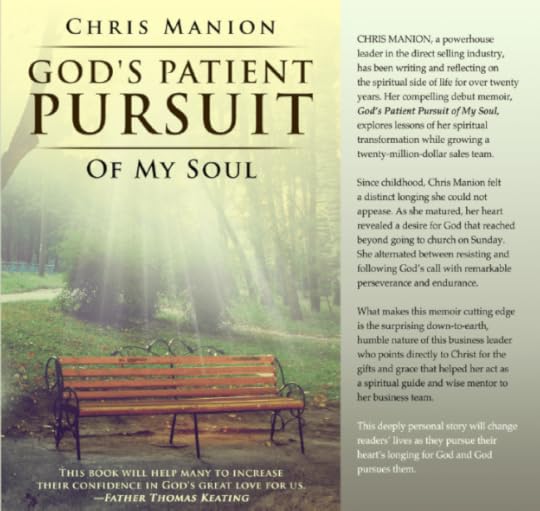
The post Surrender to love and a tea party: an invitation appeared first on Chris Manion.
Surrender to love and a tea party: an invitation
You never know when you’ll need to surrender to love. Chances are, it’ll be a test.
Genesis 22 involves a test of surrender for Abraham and Isaac. An image of my grandson setting a tea party got me thinking about God the Father as well as Abraham in that scene.
Just as Abraham pleased God with his obedience when requested to sacrifice his son—”your only son, the one you love” (Genesis 221-2 JB)—shouldn’t we be pleased with God for His same sacrifice?
God stayed Abraham’s hand at the end of the test. “I won’t ask that of you,” He seems to say. “I have something better. I’ll offer my own Son…”
[image error]Isaac was a part of Abraham – long-desired, loved, as God noted. But he existed apart from Abraham, a separate being. And old enough to surrender of his own volition – Scripture research shows him as being in his mid-thirties when he carried the wood up the mountain for the sacrifice.
They’re all around us, you know, sacrifices like Isaac’s, at least his willingness to sacrifice himself, to lay willingly down in obedience on the woodpile.
Jesus, God’s Son whom He willingly sacrificed out of love for all people for all time on a piece of wood, was loved, too. But not apart. Jesus and the Father are one. That’s what made me focus on God the Father.
The Father’s surrender to loveMost of the time, we focus on Jesus’ suffering during His passion, and rightly so. But what about His Father’s suffering? If they’re one . . . .
Have you ever watched someone you love in pain? I’m sure you have. We know how hard it is. We want to relive their agony and often can only be present, pray, and maybe try to soothe them.
What did God the Father experience as He watched men whom He created whip His Son, drop Him into a pit of vermin and spiders? As he carried His own heavy beam? As He watched soldiers strip His Son, pound iron nails into Him, and ridicule Him?
What pain did He experience since He was one with His Son? Was the pain the same as His Son?
Is that why Jesus asked us to do unto others as we’d like to be done to? Because we’re all one – we just haven’t realized it to the fullness that the Father and Son knew? Because He knew what His Father experienced?
He knew what He felt as He and His Father watched us hurt one another over the centuries. Did He command us to love one another because He wants to spare us that pain when we come into a conscious awareness of our oneness? Some theologians call that Christ conciousness. Others call it surrender to love.
Did God the Father feel Christ’s pain?How much agony did God the Father suffer when He had the power to halt the proceedings, to end the life of each man who brutalized His Son? Where does the Almighty God of the Universe go to mourn in silence when He is already everywhere?
Did God’s agony rip itself down the curtain of the Holy of Holies? Did darkness descend upon the entire universe when He mourned His Son’s death, or just over Jerusalem?
I know there are no answers, not now, not yet. But these questions wiggle into my mind, perhaps from God’s Spirit, desiring me to know Him more deeply.
Does He not always draw us closer to seeing as He sees, feel as He feels, love as He loves?
Love sets a feast. . .Death isn’t the ending to the salvation story. Death has no sting with God. He is with us in everything. He knows our pain.
Jesus rose again. We believe in the resurrection of the body (Apostle’s Creed) because of Him. There is light after the darkness, life after death. God separated the light from the darkness (Genesis 1:3-5). Yay! He gave us a new and eternal covenant sealed with His blood. Take and drink.
We are not human beings having a spiritual experience, but spiritual beings having a human experience.
Pierre Teilhard de Chardin, S.J.
God sets a feast before us. Bread of life. A cup of salvation.
. . . and a tea party.You may not choose to sit with God when he sets a tea party before you, as my grandson sets one each day for his little calico critters. But He won’t stop trying to feed you and have time with you. Click here for more on his little fingers and God’s hands.
[image error]When God sets a tea party before you, will you have time for Him?You cannot run from Him. He will gently pursue you as a parent goes to a child who’s angry, hurting, or afraid. Or as a child feeds his calico critters.
Tea…? Meow …
my little grandson to his Calico Critters
God knows everything. We don’t have to explain much in our prayers.
I can hide nothing from Him, but He will also not force me to surrender to Him whatever I choose to withhold. He can not force me to obey Him despite all He suffered for me . . . Love does not work like that. Can not work like that.
Can you imagine this kind of love? Will you try to release what you hold on to as He released His Son?
Can you imagine His blissful smile when you obey? And the abundant blessings that will follow?
All too often, we focus only on ourselves and how it hurts to let go. We want the control. We like the victim status. We’re used to grinding our teeth, hunching our shoulders, pulling our hair.
We each endure the agony of the moment we surrender to love as Jesus endured His surrender to His Father’s will in the garden.
God will send you your own angel to comfort you as you lean into your surrender. Just as He sent an angel for Jesus in Gethsemane’s garden.
Your sweet surrender to love may be the greatest act you make in this life.
Oh, the bliss that awaits. More sweet than a little boy feeding his calico critters. But just as tender.
Click my book page or this link to my multi-award-winning memoir on Amazon here for more on my trust test and surrender to love.
[image error]The post Surrender to love and a tea party: an invitation first appeared on Chris Manion.
November 29, 2020
A Thanksgiving Lesson for Advent: Be Prepared.

Before Thanksgiving, his wife asked him nicely. Several times. Then his stepdaughter mentioned it would be a good idea. Despite many warnings, someone didn’t heed them.
Sometimes we receive only one task to do. We’d like to think we’re on top of it, but we often procrastinate. We put off the preparation we need. We get stubborn. Perhaps we feel overconfident. Perhaps we think we can wing it. But on important occasions, perhaps we ought to take the time to prepare.
When Thanksgiving day came, when the turkey finished sitting in its brine, when it was time to fire up the grill and cook the Thanksgiving meat, the grill wasn’t ready.

A hush fell over the household. The men huddled and hovered over the black behemoth on the deck. Their faces bore a grim reality.
The women in the kitchen whispered and adjusted. They made room in the oven and their cooking schedule. The feast went on, the turkey got carved, and feelings got smoothed over.
Someone spent much of the day on the deck, vacuuming the grill, tinkering, calling for repairs, feeling shame at not listening to advice gently given.
I took it as a friendly reminder to keep myself ready and prepared. Specifically, I applied it to readiness for the day the Lord returns in glory. My prayer journal sat neglected. Recently, I’d cut short my prayer time. I’d put off Bible study until Advent rolled around.
Are you ready?
We won’t know the day when it comes. It will sneak up on us unannounced.
We have been told, we sing at Mass. Many have warned us to prepare our hearts. If we are not ready, we will have no excuse on that glorious day.
We’ve seen His face and heard His voice alive in our hearts.
“Live in my love
with all your heart.
As the Father has loved me, so I have loved you.”
We Have Been Told, lyrics by David Haas
Be Prepared. Yeah Yeah Yeah.
God gave us one task to do while we’re on this earth and in this body: To love God with all our heart, soul, mind, and strength. If we do this well, we naturally complete the twin commandment to love our neighbor as ourself.
We’d like to think we’re on top of this one job, but how good we are at putting off the preparation we need. Perhaps we’re overconfident. Maybe we think we can wing it. Perhaps we don’t like giving up our selfish approach to taking care of ourselves or our pet projects in order to align ourselves with God’s will and love for others.
If it’s something important, like a Thanksgiving turkey—dare I say our eternal life?—perhaps we ought to listen to those who warn us to prepare.
How’s your defiance rating lately?
Jesus warned us to be vigilant: “Beware that your hearts do not become drowsy from … the anxieties of daily life and that day catch you by surprise like a trap” (Luke 21:34) and “Be watchful! Be alert!” (Mark 13:33). Unlike Thanksgiving, we “do not know when the lord of the house is coming.” (Mark 13:35)

He gave us parables like the ten virgins, some of whom neglected to be prepared to bring extra oil for their lamps to greet Jesus, the bridegroom. By the time they realized they needed more, it was too late. Jesus closed the door with those who’d prepared for him and said he did not know the others. Ouch.
Or the guest at the King’s feast who refused to don the wedding garment. (Matthew 22:11-12) Some interpret wearing the right garment to mean a refusal to accept a garment provided upon arrival. Other Scripture scholars say the man was making a statement against what the marriage feast represented. His presence was an intolerable offense to an unprecedented invitation.
In this parable, the King gave people from all nations the opportunity to come, or not, to the marriage feast, the call to salvation. The choice is mine. The invitation is no minor matter. Neither is the garment, the fine linen of which is “the righteous acts of the saints” (Revelation 19:6-8). The Bible uses clothing as an analogy to show how we “put on” behavior that is pleasing to God.
How to respond to THE invitation
The guest’s wilful defiance to not “put on” personal righteousness when he responded to the invitation displayed a frame of mind God cannot reach. Because of that defiance, his consequences provide us sober reflection.
When the time for the Glorious Feast comes, will I be ready? Have I basted my soul in the richness of time spent with God? Have I read his instructions in the Bible or rationalized I don’t need to read it because I know what’s there?
Do I have ready the one thing necessary? The better part? (Luke 10:42) Do I have a defiant attitude about giving my time for test runs to assure I’m fit for the feast with the King of Kings? Am I sitting at Jesus’ feet or busying myself in the kitchen, or somewhere in-between?
Grateful and Ready. For Thanksgiving. For Advent.
Our grateful hearts and a well-prepared meal provide the top two ingredients to our famous American Thanksgiving tradition. I think we do the gratefulness part pretty well. Some ways my friends and family do this:
*Deliver Meals on Wheels to the needy and homebound.
*Write a thank-you note to your pastor for his encouragement throughout the year.
*Call a widow down the street or at church. Drop off dinner or run a needed errand or invite her to join your next Advent retreat or book club read.
*Support our military men and women, moms and dads. Write a heartfelt thank-you letter to a member of our military via amillionthanks.org.
The part God asks us to prepare, the part God waits for—preparing our hearts for the day our King comes—let’s not put off that part. God is here. Now. We find it difficult to keep this in mind, so the Church in her wisdom gives us a season to prepare ourselves.

So the repeatable lesson I learned this year at Thanksgiving: People act as mirrors to see ourselves. I saw myself many times this Thanksgiving in others’ actions and found new places on which I can work within myself.
Be prepared. Heed warnings. Swallow my pride and walk humbly with God. That’s what I’ll try to do this Advent.
I recommend a beautiful Advent read from a worship pastor and author friend if your heart is ready to heed God’s words. She begins a free virtual Advent retreat tonight. If you’d like to join the retreat, you can sign up here: http://www.seedbed.com/godishere.
Happy Advent from my family to yours.

The post A Thanksgiving Lesson for Advent: Be Prepared. appeared first on Chris Manion.
November 20, 2020
Children's Books
November 8, 2020
Defending Christian Faith: Lessons Learned

No matter what we do, our Christian faith is not going to please everyone. That’s a given. When someone has a bone to pick with us, it can feel like a low blow when they call us out on our Christian faith like one bully I know. Especially when it’s a Christian friend.
In my case, the bully didn’t win. But he wounded me and as a result, and I got stronger.
Plan in advance how to react to a taunt about your Christian faith.
 Photo by Albius69
Photo by Albius69Someone phoned me out of the blue one day. This person reacted poorly to something heard in a conversation. Accusations of lying and other sins pierced my ears.
I found myself in an awkward situation. The caller believed something that wasn’t true and accused me of it. No matter how many times I denied it and explained the actual facts, the caller persisted in an erroneous belief. It led to the question asked of me that resonated like a gut punch:
“And you call yourself a Christian?”
If you’ve never been accused of acting in an unChristian-like manner, this story provides an opportunity to prepare your response in advance. I invite you to view this story as an excellent spiritual exercise for your soul.
What is a proper response to this question: And you call yourself a Christian?
a) How dare you question my faith.
b) Yes, I am a Christian and a better one than you. I would never attack someone like this.
c) No Christian is perfect or without sin.
d) Yes and it seems Christ will forgive me before you will.
Taunts like this question should not receive a direct response. People throw taunts in an attempt to get a rise out of us. If we choose to rise to their bait—throw a taunt back—we give up our peace.
Any attempt to defend your Christianity and belief in Jesus Christ during an emotional tirade proves pointless. That said, the temptation to do just that licks at you like a hot flame. The taunt stings. Like a bug bite, if you scratch at it, you spread the venom.
What to do? How to defend Christian faith when someone challenges us?
Faith defense: Say an arrow prayer QUICK!

A little arrow prayer helps. Before you open your mouth and say something you’ll regret, an arrow prayer bridges you to God’s grace.
An arrow prayer is a quick, short prayer to God for help. It’s a quick request for grace to override our first instincts. For strength. For calm. For protection.
When someone taunts you or challenges us, our natural reaction is one of defense. On our own, our jaw sets. Our stomach clenches. Our fist tightens.
Your first desire? Fight back with a response you will probably later regret.
Pray fast. End with a “Thank you” as instructed in Phillippians 4:6 “with thanksgiving, present your requests to God .”
Here’s an example of an arrow prayer for this instance:
“O LORD, help me with this irate person. Thank you.”
Instead of verbally striking back, you launch a distress flare to heaven. With a deep, calming breath and an inward glance to our heart, you find God’s immediate answer. Jesus promised the Holy Spirit would give us the words when they’re needed.
And the peace of God, which transcends all understanding, will guard your hearts and your minds in Christ Jesus.
Phillipians 4:7
Watch your words and hold your tongue; you’ll save yourself a lot of grief.
Proverbs 21:23
 Photo by Leszek.Leszczynski
Photo by Leszek.LeszczynskiGod’s grace flows lightning fast to a heart seeking God’s help in times of need. Grace helps us keep the tone of our voice or text in check and to choose our words carefully so as not to inflame a sparking situation. I’m not saying I didn’t raise my voice in this incident, but I heard myself ask: Why am I shouting back? As a result, I immediately lowered my voice and spoke calmly. That’s grace at work.
How to stop a negative reaction to a faith challenge
When we find ourselves on the receiving end of a bullying comment or taunt, we feel our face flush, adrenaline pulse through us, and defensive body responses course into readiness. So first shoot an arrow prayer.
Next, after a prayer heavenward, I find it’s helpful to quickly remember what I know about good and evil. It helps stall my reaction. In other words, doing a quick mental review of good and evil helps me get a grip on overriding my primal responses, already geared for action.
The review also helps me choose on what side I’m gonna stand firm.
For example, my review might look like this:
Evil seeks disruption. God seeks mercy.
God seeks to unify. Evil seeks to divide.
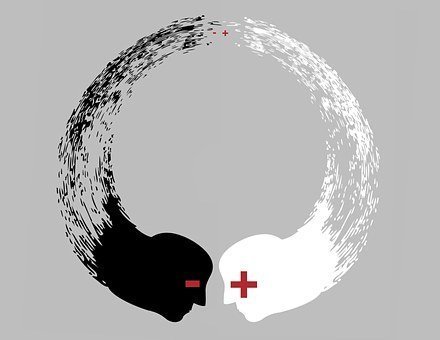
Evil hates. God loves.
Evil excludes. God includes.
Finally, from the following Scripture verses, choose one to memorize so you can recall them in a time of need.
When you are tempted, (God) will provide a way out.
1Corinthians 10:13
Do not be misled: “Bad company corrupts good character.”
1 Corinthians 15:13
What fellowship can light have with darkness?”
2 Corinthians 6:14
Like a muddied spring or a polluted well are the righteous who give way to the wicked.
Proverbs 25:26
Away from me, you evil doers, that I may keep the commands of my God!
Psalm 119:115
TIP to Memorize Scripture
Are you feeling afraid you may not remember any of the above Scriptures when you are under attack? Here’s a tip to keep one or more of them fresh in your mind.
Since many sites require us to change passwords occasionally for security purposes, one easy way to memorize Scripture is to create a new password with the verse you want to learn. Most passwords need a numeral, an upper case and lower case letters, for instance. Use the first letters of each word in your chosen Scripture to create a new password. Use the numbers 1 and 2 for I and to.

For example: “Grant me insight that I may keep your law” (Psalm 119:34 JB) could become the password: Gmit1mkyl, a 9-character password with a capital letter, numeral and lower case letters.
“Away from me, you evil doers, that I may keep the commands of my God!” could become a 15 character password Afmyedt1mktcomG! is another example.
Or type the first section of the scripture, word for word, as your password e.g. Turnawaythetaunts! (Psalm 119: 39). As a result of using this method of creating a new password, I find myself saying Scripture every time I type a password. After a while, it becomes ingrained in your mind and becomes a ready weapon when the Evil One tries to tempt us.
Take-away thoughts for defending your Christian faith.
So, a taunt offers you an opportunity to exercise your spiritual muscles as you strengthen your Christian faith and memorize Scripture. One response you can rehearse when someone taunts you is to lift her or him in prayer. With the wheelbarrow of mercy, pour your forgiveness into the hole in his or her heart with Grace, for and through Love.
Each time you rerun the incident in your mind, think of it as an opportunity to mix in a little spiritual Miracle Grow with those thoughts. Pour out such unhelpful thoughts like compost into the hole where you planted forgiveness.
Depositing our stinky thoughts in the compost pile of forgiveness and prayer does wonders for building our Christian faith and acting as Jesus did. Instead of feeling bad as an incident reruns in our mind, we can turn it for good and compost it in our forgiveness pile.
Gratitude and endurance.
 1 Thessalonians 5:18
1 Thessalonians 5:18Finally, pray a prayer of gratitude for the person who helped you exercise your heart muscles once again. Sometimes your best defense is offense.
As iron sharpens iron, so one person sharpens another.
Psalm 27:17
We endure what we must in this world of darkness and sin. We regret when we contribute to it and therefore seek God’s forgiveness. So let each persecution we experience teach us something. Recognize it as an exercise for our most important muscles of faith.
Cling to the Lord in times of trial and taunts. Our behaviors, our responses to situations of bullying or taunting may be one of our best ways of evangelizing others.
Do not make friends with a hot-tempered person, do not associate with one easily angered, or you may learn their ways and get yourself ensnared.
Proverbs 22:24-25
If you’re a fan of Star Wars, remember this about taunts: “It’s a trap!”
Find more stories like this here and here.
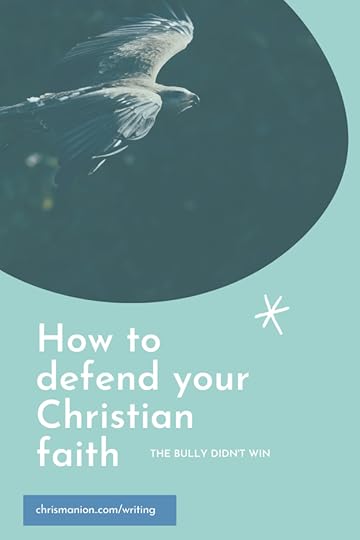
The post Defending Christian Faith: Lessons Learned appeared first on Chris Manion.
The bully didn’t win: Defending Christian Faith

No matter what we do, our Christian faith is not going to please everyone. That’s a given. When someone has a bone to pick with us, it can feel like a low blow when they call us out on our Christian faith like one bully I know. Especially when it’s a Christian friend.
In my case, the bully didn’t win. But he wounded me and as a result, and I got stronger.
Plan in advance how to react to a taunt about your Christian faith.
 Photo by Albius69
Photo by Albius69Someone phoned me out of the blue one day. This person reacted poorly to something heard in a conversation. Accusations of lying and other sins pierced my ears.
I found myself in an awkward situation. The caller believed something that wasn’t true and accused me of it. No matter how many times I denied it and explained the actual facts, the caller persisted in an erroneous belief. It led to the question asked of me that resonated like a gut punch:
“And you call yourself a Christian?”
If you’ve never been accused of acting in an unChristian-like manner, this story provides an opportunity to prepare your response in advance. I invite you to view this story as an excellent spiritual exercise for your soul.
What is a proper response to this question: And you call yourself a Christian?
a) How dare you question my faith.
b) Yes, I am a Christian and a better one than you. I would never attack someone like this.
c) No Christian is perfect or without sin.
d) Yes and it seems Christ will forgive me before you will.
Taunts like this question should not receive a direct response. People throw taunts in an attempt to get a rise out of us. If we choose to rise to their bait—throw a taunt back—we give up our peace.
Any attempt to defend your Christianity and belief in Jesus Christ during an emotional tirade proves pointless. That said, the temptation to do just that licks at you like a hot flame. The taunt stings. Like a bug bite, if you scratch at it, you spread the venom.
What to do? How to defend Christian faith when someone challenges us?
Faith defense: Say an arrow prayer QUICK!

A little arrow prayer helps. Before you open your mouth and say something you’ll regret, an arrow prayer bridges you to God’s grace.
An arrow prayer is a quick, short prayer to God for help. It’s a quick request for grace to override our first instincts. For strength. For calm. For protection.
When someone taunts you or challenges us, our natural reaction is one of defense. On our own, our jaw sets. Our stomach clenches. Our fist tightens.
Your first desire? Fight back with a response you will probably later regret.
Pray fast. End with a “Thank you” as instructed in Phillippians 4:6 “with thanksgiving, present your requests to God .”
Here’s an example of an arrow prayer for this instance:
“O LORD, help me with this irate person. Thank you.”
Instead of verbally striking back, you launch a distress flare to heaven. With a deep, calming breath and an inward glance to our heart, you find God’s immediate answer. Jesus promised the Holy Spirit would give us the words when they’re needed.
And the peace of God, which transcends all understanding, will guard your hearts and your minds in Christ Jesus.
Phillipians 4:7
Watch your words and hold your tongue; you’ll save yourself a lot of grief.
Proverbs 21:23
 Photo by Leszek.Leszczynski
Photo by Leszek.LeszczynskiGod’s grace flows lightning fast to a heart seeking God’s help in times of need. Grace helps us keep the tone of our voice or text in check and to choose our words carefully so as not to inflame a sparking situation. I’m not saying I didn’t raise my voice in this incident, but I heard myself ask: Why am I shouting back? As a result, I immediately lowered my voice and spoke calmly. That’s grace at work.
How to stop a negative reaction to a faith challenge
When we find ourselves on the receiving end of a bullying comment or taunt, we feel our face flush, adrenaline pulse through us, and defensive body responses course into readiness. So first shoot an arrow prayer.
Next, after a prayer heavenward, I find it’s helpful to quickly remember what I know about good and evil. It helps stall my reaction. In other words, doing a quick mental review of good and evil helps me get a grip on overriding my primal responses, already geared for action.
The review also helps me choose on what side I’m gonna stand firm.
For example, my review might look like this:
Evil seeks disruption. God seeks mercy.
God seeks to unify. Evil seeks to divide.

Evil hates. God loves.
Evil excludes. God includes.
Finally, from the following Scripture verses, choose one to memorize so you can recall them in a time of need.
When you are tempted, (God) will provide a way out.
1Corinthians 10:13
Do not be misled: “Bad company corrupts good character.”
1 Corinthians 15:13
What fellowship can light have with darkness?”
2 Corinthians 6:14
Like a muddied spring or a polluted well are the righteous who give way to the wicked.
Proverbs 25:26
Away from me, you evil doers, that I may keep the commands of my God!
Psalm 119:115
TIP to Memorize Scripture
Are you feeling afraid you may not remember any of the above Scriptures when you are under attack? Here’s a tip to keep one or more of them fresh in your mind.
Since many sites require us to change passwords occasionally for security purposes, one easy way to memorize Scripture is to create a new password with the verse you want to learn. Most passwords need a numeral, an upper case and lower case letters, for instance. Use the first letters of each word in your chosen Scripture to create a new password. Use the numbers 1 and 2 for I and to.

For example: “Grant me insight that I may keep your law” (Psalm 119:34 JB) could become the password: Gmit1mkyl, a 9-character password with a capital letter, numeral and lower case letters.
“Away from me, you evil doers, that I may keep the commands of my God!” could become a 15 character password Afmyedt1mktcomG! is another example.
Or type the first section of the scripture, word for word, as your password e.g. Turnawaythetaunts! (Psalm 119: 39). As a result of using this method of creating a new password, I find myself saying Scripture every time I type a password. After a while, it becomes ingrained in your mind and becomes a ready weapon when the Evil One tries to tempt us.
Take-away thoughts for defending your Christian faith.
So, a taunt offers you an opportunity to exercise your spiritual muscles as you strengthen your Christian faith and memorize Scripture. One response you can rehearse when someone taunts you is to lift her or him in prayer. With the wheelbarrow of mercy, pour your forgiveness into the hole in his or her heart with Grace, for and through Love.
Each time you rerun the incident in your mind, think of it as an opportunity to mix in a little spiritual Miracle Grow with those thoughts. Pour out such unhelpful thoughts like compost into the hole where you planted forgiveness.
Depositing our stinky thoughts in the compost pile of forgiveness and prayer does wonders for building our Christian faith and acting as Jesus did. Instead of feeling bad as an incident reruns in our mind, we can turn it for good and compost it in our forgiveness pile.
Gratitude and endurance.
 1 Thessalonians 5:18
1 Thessalonians 5:18Finally, pray a prayer of gratitude for the person who helped you exercise your heart muscles once again. Sometimes your best defense is offense.
As iron sharpens iron, so one person sharpens another.
Psalm 27:17
We endure what we must in this world of darkness and sin. We regret when we contribute to it and therefore seek God’s forgiveness. So let each persecution we experience teach us something. Recognize it as an exercise for our most important muscles of faith.
Cling to the Lord in times of trial and taunts. Our behaviors, our responses to situations of bullying or taunting may be one of our best ways of evangelizing others.
Do not make friends with a hot-tempered person, do not associate with one easily angered, or you may learn their ways and get yourself ensnared.
Proverbs 22:24-25
If you’re a fan of Star Wars, remember this about taunts: “It’s a trap!”
Find more stories like this here and here.

The post The bully didn’t win: Defending Christian Faith appeared first on Chris Manion.
October 31, 2020
The name Catherine: A Tribute to My Mother and her Connection to Halloween

My mother was the third generation Catherine among my Irish ancestors. There are probably more. I haven’t gotten very far in researching our family genealogy. My daughter carries Catherine into the fourth generation as her middle name.
Brooklyn, Kathryn Grayson, and Halloween

Blue-eyed and strawberry blond, Mom entered this world at midnight on Halloween. I felt sorry for her because as youngsters, the six of us would focus more on our costumes and trick-or-treating than on her birthday. She’d share her birthday celebration with my brother Michael, born November 1st, the day following her birthday. She didn’t seem to mind. When answering a question about family traditions for her keepsake memories, she wrote, “I don’t think we ever had any.”
She grew up in Brooklyn, New York in multi-story walk-up apartment buildings, always on the fifth or sixth floor which required the lowest rent. Her parents, who knew each other in Ballymahon, Ireland, re-met after immigrating to the Big Apple and married. Her father worked for the railroad. Money was always tight. Her mother, Kate, took in half a dozen boarders over the years, feeling sorry for people in bad circumstances and only charging them a few dollars a week for room and board.
She longed to take piano lessons, but could not afford them. She’d sometimes observe her friend’s piano lessons to try to learn. Mom always loved actors and actresses and played the lead in a French play in high school. In her day, actress Kathryn Grayson inspired her to no end. She’d see her in movies (television didn’t exist then).
Despite having little money, Mom somehow managed to change her name from Catherine to Kathryn. Later in her married life, she sighed in resignation when she was called Kay by my father’s work associates. The nickname stuck, to her chagrin.

Kathryn Grayson by Film Star Vintage 
The Power of the Name Catherine
Since learning of the multi-generational lineage of the name Catherine on my maternal side, I’ve paid close attention to Catherines, regardless of how they spell their name. One of my favorite feisty actresses is Katharine Hepburn who won four Oscars, none of which she showed up for. “As for me, prizes are nothing,” she once said. “My prize is my work.” I love that. Still, four best actress — or actor — awards is an unbeaten feat, akin to Wilt Chamberlain scoring 100 points in an NBA game.
Did you know Guess Who’s Coming to Dinner—one of her Oscar-winning performances—features one of her neices? Yep, another one carrying the name, Katharine Houghton.
The Catholic Church named two Catherines as Doctors of the Church: St. Catherine of Genoa and St. Catherine of Siena. I most recently read Paul Murray’s book Catherine of Siena: Mystic of Fire and highly recommend it as well as Enduring Grace: Living Portraits of Seven Women Msytics by Carol Flinders which includes portraits of both Catherines.
Other famous Catherines:
Catherine the Great
Catherine (Kate Middleton), Duchess of Cambridge
K. D. Lang (Kathryn Dawn), Canadian singer/songwriter
Kate Smith (given name Kathryn), American singer
Kathryn Bigelow, film director
Kathryn Grayson, actress/soprano
What the name Catherine means.
Although the name Kathryn and its derivatives do not appear in the Bible, the name likely originated with the Greek word “katharos”, which translates as “pure” or “clean” in the New Testament. I love that etymology for I think of my mother as a saint for all she physically suffered and endured with barely a grimace.
Likewise, Halloween does not appear in the Bible either, but do you know its Christian heritage? We trace the origin and customs of this special day to my mother’s people. In Ireland, an ancient pagan Celtic festival called Samhain—Gaelic for “summer’s end”—bid farewell to warmth and light. Ancient Celts believed a veil split the worlds of the living and the dead and during Samhain, they believed the veil thinned this day more than any other. This made the festival an ideal time to communicate with the deceased and to divine the future.
When the Roman Empire conquered Celt-occupied lands in the first century, they combined Samhain and other Celtic traditions with their own, thus evolving All Hallow’s Day or Allhallowmas. “Hallow” means “to sanctify.” All Saints Day honored all Catholic saints.
Seven hundred years later, in 837, Pope Gregory IV ordered the official observance of All Saints Day every November 1 to include the entire Church, having previously been celebrated only in Rome with a mass, bonfires, and people costumed as angels and saints. November 2 is set aside as All Souls’ Day, a holy day to honor the dead and departed.
Trick-or-Treating

Today’s trick or treating connects to All Saints and Soul’s Day. In the Middle Ages, poor people collected baked goods called “soul cakes” from the wealthy. In exchange for the cakes, the poor promised to pray for the giver’s deceased loved ones.
Where did Halloween come from?
Just as we once called November 1 All Hallows’ Day, the ancients called my mother’s birthday, October 31, All Hallows’ Eve. Over time, people shortened All Hallows’ Eve to Halloween.

Finally, check out the Irish history behind the jack-o’-lantern’s connection to Halloween. In ancient Ireland, those celebrating Samhain and the end of harvesttime hollowed out large turnips, potatoes or beets and carved them into a demon’s face to frighen away spirits since they perceived the thinner veil separating our world from theirs made them vulnerable then. Lighting a candle or piece of smoldering coal inside the turnips, they placed the lanterns in windows and doorways of their homes, hoping to scare off any evil spirits and welcome deceased loved ones inside.
When Irish immigrants arrived here in the early 1800s, they discovered a plentiful supply of pumpkins and more happily, found them easier to carve.

So now you know a little about my mother, a little about the traditions surrounding Halloween, and why the ancient Irish hold a surprising connection to Halloween and All Saints’ and Souls’ Day. It’s not so strange after all, to have these seemingly contrasting days one after another.
I’ve hung some ghosts in our front yard, but in a small effort to help restore the “Hallowness” of these days, they all have happy faces. Mom would have liked that.
For more, click here for a post on God’s patience as he pursues your soul and here if you’re stuck refusing to ask for help. It may please the devil.

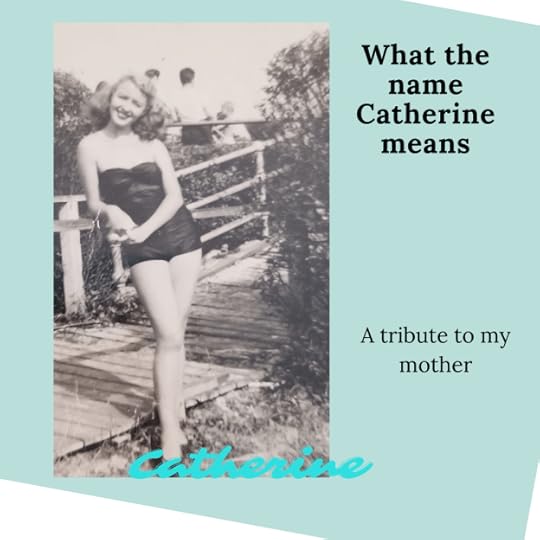

The post appeared first on Chris Manion.
October 2, 2020
But Who Do You Say I Am? A contemplative look into answering Jesus.

How would you answer this questions today: “Who do you say that I am?” It almost feels like a pop quiz, like Jesus has called us for a little chat and it happens to be in front of His Father. No pressure.
We have all wondered from time to time what others say about us. Jesus, in either a moment of teaching or a moment of clarifying how much the apostles understood, asked his apostles who people said He was. They gave various answers. Then came the haunting question.
“But who do you say that I am?”
Matthew 16:15 NIV
I find it meaningful to dig down into this question by emphasizing one word at a time.
But who do you say that I am?
When I focus on the last word of Jesus’ great question, I notice it is in the present tense. AM.
Two thousand years later, I still hear Him ask me this same question. Not who was I when I walked the earth? Not what did I do (died for my sins to open the bridge to heaven for all). He asks in the present tense: who am I to you?
It is the same question I grappled with in my teens and twenties and still grapple with now, as a retired sales executive in a Christian writing and speaking career. Who am I? For me, Jesus is very much a part of who I am.
How would I answer that question of Jesus’ today? How would you, if He asked you?
But who do you say that I…
Who is Jesus to me? Because His Father sent him to be incarnated within young Mary—the teen who God preserved from sin to be worthy to bear His Son. The I, the God/man, the Son of God, the humble One, bears the name Jesus, which the angel Gabriel instructed Him to be named (Matthew 1:21).
God has avoided any other names. “I AM” is the only answer He gives Moses. God is not concerned with what name people call Him. He’s more concerned with having a relationship with us. When He tried all sorts of manner of developing that relationship, He finally sent His Son. His Spirit prophesied it through the prophets.
The “I” in this question begs us to recognize Him, the one whose name requires we honor it. If the name is holy, no wonder we have some difficulty answering who the I is…
That at the name of Jesus every knee should bow, of things in heaven, and things in earth, and things under the earth;
And that every tongue should confess that Jesus Christ is Lord, to the glory of God the Father.
Philippians 2:10-11 JKV
But who do you say that…
That thing you say about Jesus. What is it? What is that relationship?
What is it we say about him? Do we get all tongue-tied? Have we tried to use our own words instead of anyone elses? Is that what Jesus wants to hear from you and me, that. . .?
But who do you say …
Now we’re getting to the core of this question? What do we say? Do we say anything at all?
Are we silent, pondering like Mary, keeping all these things we think and read in the Bible and other sacred reading to ourselves? If that is a good thing, then why is Jesus asking His apostles what they are saying about Him?
It’s important to Jesus that we say His name, that we tell others about who we believe in and how that relationship matters to us.
When was the last time you said His name or what He means to you and who He is to you in a conversation outloud? St. Paul instructed the people of Philippi that “every tongue should confess His name.”
Are you embarassed to say His name outloud?
But who do you…
Yes, you. Jesus is looking at you and me. Can you see His face with that loving look? How tender, how deep He looks into our soul. Have you imagined those gentle eyes, that slight smile that communicates without words how much He loves you?

Just as we cherish a handwritten letter or video from a loved one, so Jesus cherishes what you and I say about Him.
But who do…
DO you say anything about Him?
DO others hear us speak His name, share what He means to us? Or do we keep that private?
DO we sense Him waiting to hear us not only call to Him, but speak of Him?
But who…
Who is He to us, this Jesus? How far do we keep Him away from us?
Do we locate Him far away in heaven somewhere? How far do we think He really is from us? Who is this Jesus to us? Someone closer than our breath?
Someone who lives within us? Who knows our every thought? Who knew us before we were conceived in our mother’s womb?
Look how intimately He spoke to Jeremiah.
Before I formed you in the womb I knew you, before you were born I set you apart; I appointed you as a prophet to the nations.
Jeremiah 1:5 NIV
Imagine Jesus says your name after the words above “I knew you.” Trust those words.
But…
We put a lot of “buts” in our relationships, don’t we? We excel at rationalizing our faith, our prejudices, the way we hold certain opinions of others.
After Jesus hears all that the people are saying about Him from the apostles, He adds the important “but.” It’s as if He tells them, what I most want to hear is what YOU think.
It’s as if He’s saying to you and me, I know you don’t know quite how to put who I am to you into words, but if you did know, what would you say?
You are the love from which I love. You are the source of all my longings. You are a joy so jubilant and a tenderness so sweet on my lips that I melt away in self forgetfulness. You are so pure I cannot approach and so great, I cannot imagine. You are my love. My everything.
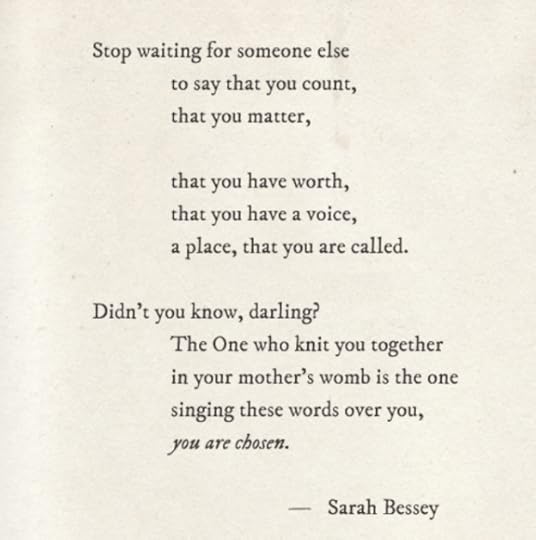
In my award-winning memoir, I explore the question of Jesus can be my best friend and how I discovered Jesus wooing me for years. Click here to read what others said about the memoir and here to read the first two chapers free. Available as ebook, audiobook, and softcover.
The post But Who Do You Say I Am? A contemplative look into answering Jesus. appeared first on Chris Manion.
September 28, 2020
5 Ways to Deal with the Essential Sadness of Today

I keep waking up to a gnawing sadness in my spirit these days. Perhaps you know what I mean?
The sadness doesn’t surprise me with all that’s going on in the world today: the double-edged sword of a pandemic that some refuse to respect; a rising uncomfortable consciousness about racial injustice; a growth and boldness of white supremacist fanatics; politicization of widespread social unrest; recent executions; social restrictions and isolation; hurricanes; fires; disdain for democracy.
I don’t like looking at that list or typing it, but it certainly makes clear the source of emotional pain. This list also points to why we need some healthy ways to deal with our sadness since most of these are not going away soon.
Why is it an essential human response?
Did you know that psychologists report sadness is essential to our well-being and survival? Well, it is. Sadness is a natural human response to pain or loss of any kind. It tells us some event or inner experience hurt us.
Sadness lets us know we need to grieve and to seek out those who love and support us. Except we can’t always be with those who love us these days. I see your eye roll. I’m with you. There’s hope below as you work through your hurting heart.
Let’s take a look at the connection between sadness and grieving, then explore five healthy ways to deal with this emotional pain.
Parallels with C. S. Lewis’ book, A Grief Observed
Take a look with me at a passage from C. S. Lewis’ A Grief Observed. Search for parallels between how you’re feeling these days and Lewis’s words as he reflected on the experience of grieving the death of his wife, Joy who died at the age of forty-five in 1960.
And then one or other dies. And we think of this as love cut short; like a dance stopped in mid-career or a flower with its head unluckily snapped off—something truncated and therefore, lacking its due shape. I wonder. If, as I can’t help suspecting, the dead also feel the pains of separation (and this may be one of their purgatorial sufferings) then for both lovers, and for all pairs of lovers without exception, bereavement is a universal and integral part of our experience of love. It follows marriage as normally as marriage follws courtship or as autumn follows summer. It is not a truncation of the process but one of its phases …
We are ‘taken out of ourselves’ by the loved one while she is here. Then comes the tragic figure of the dance in which we must learn to be still taken out of ourselves though the bodily presence is withdrawn, to love the very Her, and not fall back to loving our past, or our memory, or our sorrow, or our relief from sorrow, or our own love.
from A Grief Observed.

If you have lost a loved one, I hope these words bring some hope or salve to you and that God grants you consolation and peace.
Our loss leads to sadness and grief.
Your life as you knew it died with this pandemic. It unraveled and got tied in knots all at the same time. C. S. Lewis’s image of a flower with its bloom snapped off feels like a worthy description for our quarantine brains and lives.
Lewis describes his grief life as truncated. I like that word. It speaks to my sadness. It speaks to the lost shape of our lives.
If bereavement is a “universal and integral part of our experience of love,” as Lewis proposes, then sadness is an integral part of U.S. life with a pandemic, amoral leadership, and cultural upheaval.
While we live with a heaviness of our spirit, our emotions can morph like clouds. When they do, it’s important to remind ourselves we are not helpless. We are not victims of our thoughts. Sadness is not weakness.
We can self-sabotage or self-govern when dealing with our feelings. I choose to self-govern as my daily practice and encourage you to do the same.
Healthy ways of addressing our emotions help us through emotional pain.
Five Healthy Ways to Deal with Sadness and Emotional Pain
Give yourself support in your sadness and grieving.
First, ask God for help.
Our sacred traditions help us live with the tensions of this heavy time. Your church may be closed. Regardless, soak daily in the living Word of God [listen to “First Fruits,” my Facebook Live M-F broadcast on the day’s Mass readings]. Pray daily, both out loud and in silence. Perhaps you’re ready to try a new way of praying. You might try a contemplative method called centering prayer. Check out Thomas Keating’s Open Mind, Open Heart (available at Alibris Books for $1.99) and Cynthia Bourgeault’s books on centering prayer. She offers this explanation to learn more about this extraordinary prayer that is growing worldwide. Centering Prayer has a Christian foundation going back hundreds of years. The Cloud of Unknowing , offered at Abe Books for $2.50, is the book on which the centering prayer method was based.
“Prayer is not a request for God’s favours…Genuine prayer is based on recognizing the Origin of all that exists, and opening ourselves to it.”
~Cynthia Bourgeault
Second, trust your sadness.
Psychologists teach us we have two “brains:” one is emotional and one is thinking. Our thoughts tells us we’re sad, but we aren’t always sure how to connect to the emotion. Our instinct is sometimes to push it away and that’s understandable. When we trust the sadness is there to help us, we can own it and honor it. Sit with it and trust its ability to guide you through what hurts. You’ll come through it feeling stronger. Sadness lets us move forward when we give ourselves time to process it. Do this and remarkably, sadness dissipates like fog and reveals joy like fresh dew on morning grass.
Third, seek those who love and support you.
Some of us live alone and it’s not always easy to be with those who love us. When we’re full of pain, we don’t always think clearly and may have a hard time recalling who cares about us.Getting a hug is risky outside of family members, but if you have a pet, or a neighbor whose pet likes you, their unconditional love does wonders. It helps us to have our feelings understood, so reach out by phone or video or Marco Polo (a free app that turns your phone into a one-way video walkie-talkie). Tell someone trustworthy how you’re feeling.When you cannot be with those you love and support you, look for someone you can console instead. Doing a good deed or being a good listener takes the focus off our pain and turns it into productive action.
Fourth, use affirmations.
Affirmations help when you’re stuck and I was most definitely stuck lately. Immobilized, to be specific. Join my email list and receive a list of affirmations.To set an affirmation, sit down and decide what it is you’re feeling. You may have to go through a few descriptions until you hit on the core truth at the bottom of your feelings. Then write an affirmation to counter those states of mind. Here are the feelings I wrote down: unfocused, in need of “my people,” and sad. I set a new affirmation to directly address those: I am focused, loved and joyful.
At first, it may feel like you’re lying to yourself when you repeat your affirmation. You’re not lying. You’re choosing a truth you want to live by. Repeat it often to yourself. You don’t even have to believe it at first. Your unconscious does not know the difference and will surprise you at how responsive it is.
 with one of my grandsons
with one of my grandsonsFifth, practice Guard of the Heart
Guard of the Heart is a spiritual tool of attention to help us preserve our peace of heart. By putting our attention at the entrance of our heart, we notice when we don’t feel at peace and what kinds of peole, places, and things endanger this well-being. This is a practice similar to how parents protect their little ones from harmful influences, by making careful choices of who their children play with, what TV and videos they watch, and what foods they eat.
Guard of the heart prevents easy entry of any disturbance into our heart. It requires us to take control of what goes in and what the heart has to ‘feel.’
Mary Margaret Funk, — Tools Matter For Practicing the Spiritual Life
Guard of the heart is a practice that follows a resolution about something. When my tender mother’s heart couldn’t take any more negative energy, I used this practice. Resolve to guard your heart from outside forces that disturb it. “When we want strongly to follow through with our resolution we should guard our heart from doubt and from counter experiences that move us away from our resolve.” Your heart provides your innermost experience of being with God so it is important to guard it. When your emotions are frail or your spirit tender, guarding your heart protects your well-being and relationship with God and others.When you feel sadness, guard your heart from music, songs or movies that feed that sadness. I had a Pandora channel on the other day and suddenly found myself almost weepy. I realized the music triggered the emotion and changed the channel. Your heart will be full of strength and commitment when you protect it and guard it.
Honor your feelings of sadness or grief as part of your life journey

Honor your feelings of sadness or grief as part of your life journey
Click To Tweet
The spiritual journey can never be a privatized set of practices,
because whenever you start the spiritual journey,
the whole of humanity, and perhaps creation,
goes along and shares the journey with you.”
Thomas Keating, www.spiritualityandpractice.com/ecourse Forgiveness – Growth in Love
It’s important to honor your feelings. It might be helpful to think of your sadness in terms of grief. Grieving is an individual process of learning to live with loss.
In college, I took a course on Death and Dying in which I learned the five stages of grief, as identified by Dr. Elisabeth Kübler-Ross. They are denial, anger, bargaining, depression, and acceptance, not necessarily in that order. Kübler-Ross says not everyone experiences all five, but at least two are part of all grieving. This year in this pandemic, I moved through four of these stages.
You may experience several stages in a “roller coaster” effect—switching between two or more stages, returning to one or more several times before working through it. If one of the stages comes back, give it space.
Be gentle with yourself.
Sadness and grief are natural parts of living. You will get through it and get to the acceptance stage. Be prepared to be tired. Grief work is fatiguing and remember, it’s not always about someone dying.
We may increase our compassion for one another’s emotions and spirits if we think that all of us are grieving in some way. Like the MADD group (Mothers Against Drunk Drivers) used their grief for good, we can turn our sadness into greater compassion and consciousness for how we all carry invisible pain. May God help us all.
Some people don’t handle emotions well. Pray for them as I pray for you.
 Photo by lorenkerns
Photo by lorenkernsClick here for more on hope.
Many thanks for taking the time to read my work. I sure appreciate your support. Take a second and like or follow me below. It just may help sell my next book!


[image error]


~ Pin for Later ~



The post 5 Ways to Deal with the Essential Sadness of Today appeared first on Chris Manion.



